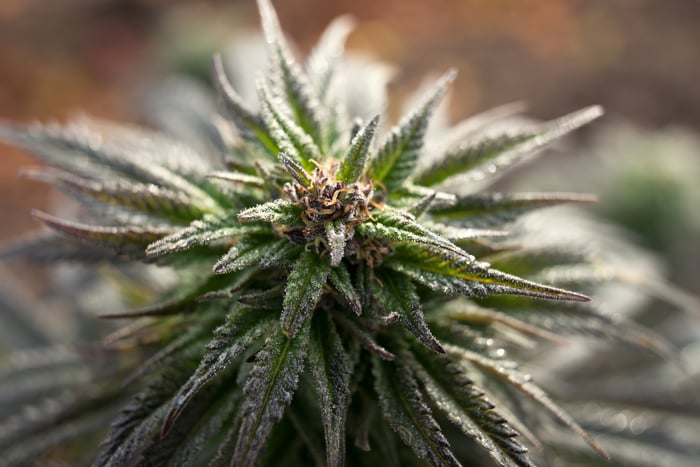For years, the marijuana industry has been budding before Wall Street's and investors' eyes. After growing to $10.9 billion in legal licensed-store sales in 2018, the newest report, "State of the Legal Cannabis Markets," from Arcview Market Research and BDS Analytics calls for a compound annual global growth rate of better than 24% through 2024. For you math-phobes, we're talking about greater than $40 billion in global licensed sales by 2024.
This type of growth opportunity simply doesn't come around often, which is why we've witnessed a flurry of aggressive expansion and acquisition activity since the beginning of 2018. The goal, of course, is to grab as much early stage market share as possible. Unfortunately, this acquisition free-for-all might come at a price to the shareholders of a select few cannabis stocks.

Image source: Getty Images.
There's rarely anything good about goodwill
You see, when one company buys another, it's quite common for a premium to be paid to the acquired company, above and beyond tangible assets. This premium is often recognized on the purchasing company's balance sheet as "goodwill." Rarely is goodwill ever a good thing.
The hope is that the acquiring company will be able to recoup the premium it's paid, thereby demonstrating to investors that it made a wise purchasing decision, both in terms of long-term growth opportunities and with regard to the price it paid for the asset in question. But this premium isn't always recouped, which can sometimes lead to acquiring companies recognizing a writedown in the value of the business or businesses they've bought many quarters or years down the line. Essentially, a writedown is an admission that a purchaser overpaid for an asset or group of assets.
Right now, there are a lot of cannabis stocks with tens of millions of dollars of goodwill on their balance sheets. But, in general, this goodwill represents less than 20% of their total assets, so it's not a major concern -- at least not yet.
There are, however, two pot stocks whose goodwill currently comprises well over 50% of their total assets, making them the likeliest in the cannabis space to write down at least a portion of their goodwill, and thereby take eyesore losses in the foreseeable future.

Image source: Getty Images.
Aurora Cannabis
You might be surprised to learn that the most popular cannabis stock in the world, at least among millennial investors, also happens to be carrying around an insane amount of goodwill (and intangible assets, for that matter).
As of Aurora Cannabis' (ACB 7.80%) fiscal third-quarter operating results, the company that had made 15 acquisitions since August 2016 was lugging around 3.18 billion Canadian dollars in goodwill (about $2.39 billion), which compares to the company's total assets of CA$5.55 billion. That's 57% of the company's total assets built on the "hope" of recouping the premium it paid to acquire more than a dozen other companies.
How did Aurora compile such a jaw-dropping amount of goodwill in the relatively nascent cannabis space? A significant portion of the blame ties into the company's July 2018 purchase of MedReleaf for CA$2.64 billion in an all-stock deal. As of March 31, 2019, Aurora recognized just CA$537.3 million as "net identifiable assets acquired," meaning the remaining CA$2.11 billion is currently being recognized as goodwill. More than half of Aurora's ICC Labs purchase and nearly 69% of the value of its Whistler Medical Marijuana buyout have also been recognized as goodwill.
Sure, there's the possibility that Aurora Cannabis is going to recoup some of this value through property development and future earnings streams. But the way the company's balance sheet looks right now, it appears that management grossly overpaid for most of its acquired assets. It would be difficult for an established company to recoup CA$3.18 billion in goodwill, let alone in an industry that's still trying to find its footing in the legal environment. That makes Aurora a prime candidate to write down a significant portion of its goodwill at some point in the future.

Image source: Getty Images.
iAnthus Capital Holdings
The other pot stock is nowhere near as well-known as Aurora Cannabis, but it's arguably in even worse shape with regard to its goodwill.
U.S.-focused, vertically integrated dispensary operator iAnthus Capital Holdings (ITHUF -13.02%) would appear to be set up for big-time success as more states legalize recreational and medical cannabis. The United States is expected to run circles around the Canadian market in terms of peak annual sales, making it important that multistate dispensary operators like iAnthus expand into new markets and build their brand. That was the impetus behind iAnthus' sizable acquisition of MPX Bioceutical earlier this year.
The issue is that the MPX acquisition has been recognized almost entirely as goodwill. As of March 31, 2019, CA$518 million of the deal was considered goodwill, which ultimately pushed the company's aggregate goodwill up from CA$37.5 million in the sequential quarter to an unsightly CA$555.4 million. With total assets of CA$797.6 million, goodwill accounts for 70% of this figure.
Making matters scarier, iAnthus reported current assets of CA$84.7 million at the end of March but current liabilities of CA$106.7 million. In layman's terms, this suggests that, at least as of March 31, 2019, the company didn't have adequate cash, cash equivalents, and investments on hand to cover expenses over the next 12 months. Now, it should be noted that the company did complete a CA$25 million private placement of unsecured notes at the beginning of May, but the prospect of needing capital still seems highly likely here.
In my opinion, no cannabis stock is in greater danger of a writedown than iAnthus Capital.





